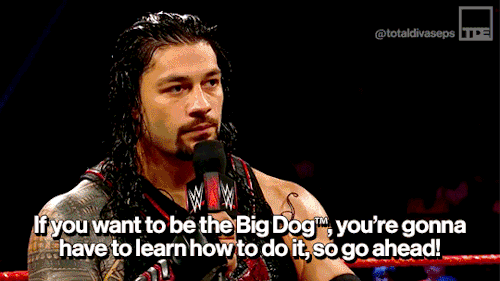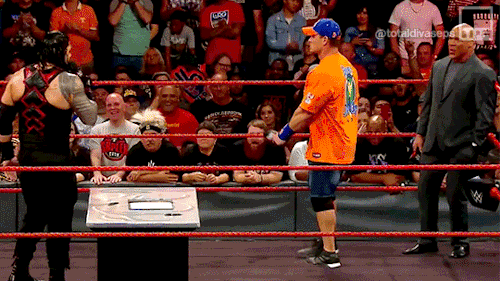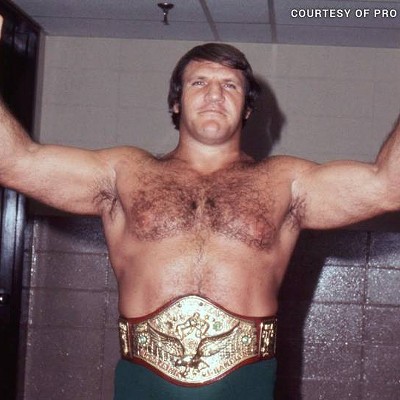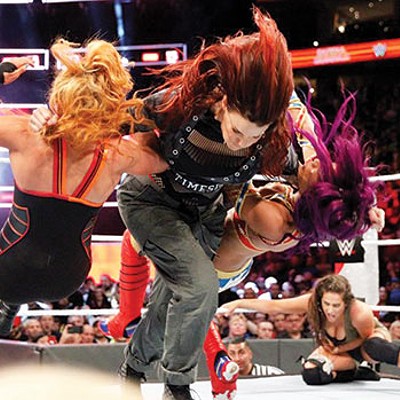Friday, September 1, 2017
John Cena versus Roman Reigns: MetaGear Solid
Professional wrestling is in a world of its own in terms of the relationship the business has to its fans.
The trajectory of the show can be changed through the voice of the fans, both literally and figuratively, as crowd reactions and merchandise sales both indicate which performers the crowd believes should have larger roles. Fan reaction forced Vince McMahon’s hand away from putting the WWE world heavyweight championship on the returning (and now blockbuster megastar) Dave Bautista, as the crowd was firmly behind the underdog story of Daniel Bryan, ultimately culminating in his championship win at Wrestlemania 30.
It was the fans' response to the now infamous “Austin 3:16” promo that helped strap a rocket to WWE hall-of-famer Stone Cold Steve Austin. This is a phenomenon that cannot be achieved in other media. Nobody was writing letters to Vince Gilligan asking for Badger to get boosted to the top of the cast of Breaking Bad. Fans weren’t taking to Twitter to tell the writers of LOST that the Jack and Kate storyline was being pushed down their throats and that the two characters were mostly unlikable. Wrestling fans have a power, or “hold the keys” as John Cena elegantly put it on the most recent episode of Monday Night Raw, that no other fandom can claim. Even if it doesn’t feel like it, wrestling fans can change the show.
That’s what makes Monday’s contract signing between Roman Reigns and John Cena so memorable. In a segment that many old-head wrestling fans would refer to as “exposing the business,” the two superstars lifted the veil and acknowledged insider terms, backstage politics and even blatantly broke the fourth wall in one of the most gripping RAW moments of recent memory.
It is no secret that the WWE brass sees Roman Reigns as the future of the WWE, and has made every effort these past three years to get him to fill the shoes that have previously been filled by Hulk Hogan, Dwayne “The Rock” Johnson and currently John Cena. Reigns has been polarizing to fans throughout this process, as many don't believe he's ready to be thrust into the spotlight, think his push is too aggressive, or simply do not care for his character. This resistance to Reigns’ ascendance has helped create a career renaissance for John Cena, who is now on a part-time schedule and is finally being heralded by even the smarkiest of fans as one of the best in the business. The idea of a Cena/Reigns feud has been building for quite some time, as a preparatory passing of the torch so that Reigns may finally claim his throne.
With the gravity of this rivalry, WWE can’t afford to do their cookie-cutter formula (which is often a three month story, where the two swap wins in unsatisfactory fashion before the good guy finally prevails). Instead, Vince & Co. decided to take a chance on a method that wrestling forefathers believed would destroy the business: exposing it.
John Cena went all-in on the fans’ gripes with Reigns, referring to him as the “High-Exalted Roman Reigns” and stating that although everyone in the back knows he’s destined for greatness, the crowd is “still figuring it out.” Cena acknowledged his own struggles with fans, addressing a belief held by many that his character has gotten stale and needs a new direction.
“You can hear those people so desperately wanting me to change the content of my character,” Cena states, “maybe a little heel turn.”
Cena has teased the “heel turn” notion before, but was much more blatant in acknowledging it as a character concept. This feud completely subverts any sort of face-heel dynamic, as this fight has no inherent good or evil, but rather is two people existing in multiplicitous ways pitted against each other. When it comes to “The Big Dog” versus “Big Match John” — there is no dichotomous good or evil. They are both and neither simultaneously.
There were other veil-lifting statements made, be it about the burials, the two men’s status with the United States Championship, and Cena’s role in the company. The two went back and forth in the segment filled with more meta references than a Deadpool comic. The crowd was invigorated, the words were heated, and the men were ripe with emotion. For once, a rivalry felt refreshing, cutting and real.
In the opening scene of the Netflix original series House of Cards, we witness Kevin Spacey’s character Frank Underwood break the neck of a dying dog, making a statement about the two variations of pain: “the sort of pain that makes you strong,” he states, “and useless pain.”
As he makes this statement, he breaks every rule for suspending disbelief: he stares stone-faced into the camera, and he directly addresses the audience. Yet, instead of taking you out of the moment, it pulls you in. This opening scene shows you what kind of character Frank Underwood is, gives you a glimpse into how he views the world, and most importantly, lets you know that he knows you’re watching. You can make a snap judgment about his morality right away, and Underwood makes you complicit to his crimes by pulling you in and connecting you to him. You’re a voyeur in his climb to the top of the ladder, an accomplice to whatever misdeeds he commits along the way. House of Cards has been nominated for 46 Emmys, winning six. They have proven that the formula can be successful.
Wrestling fans often watch the shows under a hyper-critical lens, judging the show segment by segment and expressing displeasure at how a character is being mistreated, underutilized or over-pushed. We judge the show by our own metrics, how we want it to play out rather than how it actually does. For WWE to not only address a concern that many fans have expressed but to explicitly write it into the show is their own Spacey-esque pull of complicity. Fans overwhelmingly reacted to this segment because much like Daniel Bryan’s “Miracle on Bourbon Street,” Vince McMahon did not create this story, we did. Now we’re along for the ride.
The trajectory of the show can be changed through the voice of the fans, both literally and figuratively, as crowd reactions and merchandise sales both indicate which performers the crowd believes should have larger roles. Fan reaction forced Vince McMahon’s hand away from putting the WWE world heavyweight championship on the returning (and now blockbuster megastar) Dave Bautista, as the crowd was firmly behind the underdog story of Daniel Bryan, ultimately culminating in his championship win at Wrestlemania 30.
It was the fans' response to the now infamous “Austin 3:16” promo that helped strap a rocket to WWE hall-of-famer Stone Cold Steve Austin. This is a phenomenon that cannot be achieved in other media. Nobody was writing letters to Vince Gilligan asking for Badger to get boosted to the top of the cast of Breaking Bad. Fans weren’t taking to Twitter to tell the writers of LOST that the Jack and Kate storyline was being pushed down their throats and that the two characters were mostly unlikable. Wrestling fans have a power, or “hold the keys” as John Cena elegantly put it on the most recent episode of Monday Night Raw, that no other fandom can claim. Even if it doesn’t feel like it, wrestling fans can change the show.
That’s what makes Monday’s contract signing between Roman Reigns and John Cena so memorable. In a segment that many old-head wrestling fans would refer to as “exposing the business,” the two superstars lifted the veil and acknowledged insider terms, backstage politics and even blatantly broke the fourth wall in one of the most gripping RAW moments of recent memory.
It is no secret that the WWE brass sees Roman Reigns as the future of the WWE, and has made every effort these past three years to get him to fill the shoes that have previously been filled by Hulk Hogan, Dwayne “The Rock” Johnson and currently John Cena. Reigns has been polarizing to fans throughout this process, as many don't believe he's ready to be thrust into the spotlight, think his push is too aggressive, or simply do not care for his character. This resistance to Reigns’ ascendance has helped create a career renaissance for John Cena, who is now on a part-time schedule and is finally being heralded by even the smarkiest of fans as one of the best in the business. The idea of a Cena/Reigns feud has been building for quite some time, as a preparatory passing of the torch so that Reigns may finally claim his throne.
With the gravity of this rivalry, WWE can’t afford to do their cookie-cutter formula (which is often a three month story, where the two swap wins in unsatisfactory fashion before the good guy finally prevails). Instead, Vince & Co. decided to take a chance on a method that wrestling forefathers believed would destroy the business: exposing it.
John Cena went all-in on the fans’ gripes with Reigns, referring to him as the “High-Exalted Roman Reigns” and stating that although everyone in the back knows he’s destined for greatness, the crowd is “still figuring it out.” Cena acknowledged his own struggles with fans, addressing a belief held by many that his character has gotten stale and needs a new direction.
“You can hear those people so desperately wanting me to change the content of my character,” Cena states, “maybe a little heel turn.”
Cena has teased the “heel turn” notion before, but was much more blatant in acknowledging it as a character concept. This feud completely subverts any sort of face-heel dynamic, as this fight has no inherent good or evil, but rather is two people existing in multiplicitous ways pitted against each other. When it comes to “The Big Dog” versus “Big Match John” — there is no dichotomous good or evil. They are both and neither simultaneously.
There were other veil-lifting statements made, be it about the burials, the two men’s status with the United States Championship, and Cena’s role in the company. The two went back and forth in the segment filled with more meta references than a Deadpool comic. The crowd was invigorated, the words were heated, and the men were ripe with emotion. For once, a rivalry felt refreshing, cutting and real.
In the opening scene of the Netflix original series House of Cards, we witness Kevin Spacey’s character Frank Underwood break the neck of a dying dog, making a statement about the two variations of pain: “the sort of pain that makes you strong,” he states, “and useless pain.”
As he makes this statement, he breaks every rule for suspending disbelief: he stares stone-faced into the camera, and he directly addresses the audience. Yet, instead of taking you out of the moment, it pulls you in. This opening scene shows you what kind of character Frank Underwood is, gives you a glimpse into how he views the world, and most importantly, lets you know that he knows you’re watching. You can make a snap judgment about his morality right away, and Underwood makes you complicit to his crimes by pulling you in and connecting you to him. You’re a voyeur in his climb to the top of the ladder, an accomplice to whatever misdeeds he commits along the way. House of Cards has been nominated for 46 Emmys, winning six. They have proven that the formula can be successful.
Wrestling fans often watch the shows under a hyper-critical lens, judging the show segment by segment and expressing displeasure at how a character is being mistreated, underutilized or over-pushed. We judge the show by our own metrics, how we want it to play out rather than how it actually does. For WWE to not only address a concern that many fans have expressed but to explicitly write it into the show is their own Spacey-esque pull of complicity. Fans overwhelmingly reacted to this segment because much like Daniel Bryan’s “Miracle on Bourbon Street,” Vince McMahon did not create this story, we did. Now we’re along for the ride.
Tags: Smark Attack , Image



















